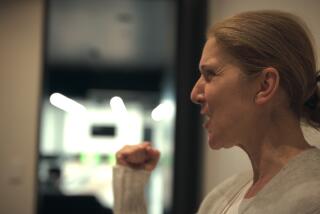Q&A with Catherine Breillat
With Catherine Breillat, it is best to simply expect the unexpected. The 63-year-old French filmmaker has long been one of international cinema’s leading provocateurs, pushing audiences to uncomfortable places with her explorations of the emotional development of young women and the ongoing male-female battles over the relationship between sex and power. While she has at times run afoul of censors for her explicit imagery, most notoriously with her 1999 film “Romance,” it is the bruising intellectual attack of her ideas that have made her films perhaps more shocking.
With “The Sleeping Beauty,” which opens in Los Angeles on Friday, Breillat continues what she began with 2009’s “Bluebeard” — bending classic fairy tales to her own purposes, making them hers while including a startling sweetness. In “The Sleeping Beauty,” a young girl is cursed to sleep for 100 years and within her slumber has a series of fantastic adventures that Breillat transforms into a witty playground for personal discovery.
One thing is for certain: Breillat is not slowing down or letting up. “I’m like that little girl in ‘Sleeping Beauty,’” she said during a recent phone call from Paris. “I’ve always liked challenges and I like being the hero.” More from the conversation:
Q. With your fairy-tale films, it seems as if you are telling stories that deal with the same concerns as your previous work, but it’s like you’re sneaking those ideas in under the radar.
A. I think that cinema is about that: It offers you the possibility of going to the very end of your feelings and in fact makes you feel things that you don’t feel when you experience the same things in reality. If I look at my first film, for example, “A Real Young Girl,” I sometimes wonder if that film isn’t more provocative, more scandalous, than “Romance,” even though it wasn’t as explicit.
I think also that it is not necessary to try to explode boundaries, break boundaries you’ve already been through in previous films. You don’t have to repeat yourself. I’m interested in making films, not provocations. On the other hand, if I am provoked, if the law forbids me from doing certain things, you can be sure I’m going to do them.
Q. There seems to have been a shift in your filmmaking since your recovery from a stroke in 2004; they are now not as overtly confrontational. I’m wondering if they seem that way to you? Or if you think your stroke has impacted the stories you are interested in telling?
A. I don’t know. I’m not sure if I’ve been affected by the stroke, or if I have, it’s certainly not in a negative way. I’ve never felt more energetic as I do today. It’s always been a challenge to finance my films, but the bond companies love me because I’m the only director in France who never goes over budget or needs even an hour longer shooting my films.
Q. Many of your earlier films dealt with teenagers on the cusp of adulthood. Now it seems you’ve worked back to exploring childhood as it transitions into adolescence.
A. I’ve always been extremely interested in dealing with very young girls, even younger than the teenage years, but I was always afraid to do it, I was afraid of the laws that control how you can work with young children. You can only shoot a limited number of hours every day. Just to give you an idea of the limits we’re up against working with young children, in ‘Sleeping Beauty’ with the little girl and the little boy, the law forbids me from having them kiss each other. The government agency that protects minors working in cinema looked at the script and I had to sign off on that.
So what I did instead is place them in the same bed like a married couple even though they weren’t kissing. And that was far better than if they simply kissed. So I’m deeply indebted to the censors because they always force me to do things that I hadn’t thought of myself, things they haven’t forbidden always work out much better.
More to Read
The biggest entertainment stories
Get our big stories about Hollywood, film, television, music, arts, culture and more right in your inbox as soon as they publish.
You may occasionally receive promotional content from the Los Angeles Times.











